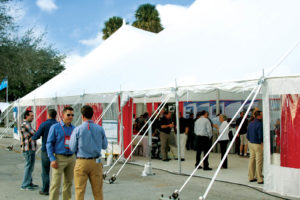
Owners, managers and employees of tent and event rental businesses, even shareholder-employees—have long been allowed to claim an income tax deduction for the expenses of attending trade shows, conferences and meetings. Thanks to federal tax laws, the government will pick up the tab for a sizable portion of the expenses of attending events, if the rules are followed.
Generally, to qualify for trade show-related tax deductions, all that is required is that the attendee be able to show that attendance at the show had business-related benefits.
Underwriting with tax deductions
Federal tax rules allow a tax deduction for all of the ordinary and necessary expenses incurred while carrying on a trade or business, which means that every business person can deduct the expenses of attending a meeting, trade show or convention. All that is required is a bona fide business purpose.
Unfortunately, if a spouse, dependent or other individual without a bona fide business purpose accompanies an attendee on a business trip, even a trip to a trade show, that individual’s travel expenses are not usually tax deductible. Incidental services, such as keeping notes or assisting in entertaining customers, are not enough to make the expenses deductible.
If a business associate, such as a current or prospective customer, client, supplier, employee, agent, partner or professional advisor travels with an attendee and meets the conditions, those expenses can be deducted.
New rules recently proposed by the IRS would allow convention or trade show attendees, except the self-employed, to deduct the cost of local lodging as long as it is business related.
Receipts: necessary or unnecessary?
Receipts for expenses of $75 or less are not required; however, whenever business expenses are claimed it’s a good idea to keep detailed records and receipts for everything. A receipt for lodging of any amount, even at a discount motel, is almost always required.
For the trade show itself, a copy of all charges, as well as the conference schedule, can help prove the event’s relevance to your business.
While there is no overall dollar limit on the amount that can be deducted for trade-show-related expenses, entertainment and meal costs that are “lavish and extravagant” cannot be deducted.
Per day, per diem
When it comes to lodging, meals and other incidental expenses, the IRS will allow every business person to claim a federal “per diem allowance,” which is determined by the location of the trip and/or conference. There is a per diem rate for lodging and meals and incidentals.
However, regardless of whether actual cost or the per diem allowance is used, generally only 50 percent of the unreimbursed meal’s cost can be deducted. But everyone traveling away from home for any length of time may deduct half of the per diem allowance rather than half of the actual cost of meals, laundry, cleaning and tips.
The advantage to using the per diem standard meal allowance is that records don’t have to be kept of actual meal expenses, although records do have to be kept to prove the time, place and business purpose of all travel. The disadvantage is that the per diem allowances are not generous. Chances are that the actual expenses would be larger.
A working vacation
A business person is permitted to deduct all travel expenses if the trip was entirely business related. If the trip was primarily for business and, while at the business destination, the stay was extended for a vacation for personal activities, only the business-related expenses can be deducted.
If the trip was primarily for personal reasons, such as a vacation before or after attending the event, the entire cost of the trip is usually a nondeductible personal expense. However, any expenses that are incurred while at that destination and are directly related to the business are deductible.
Changing the rules
The IRS recently updated the procedure for taxpayers deducting travel expenses related to business and investment income, including sole proprietors. Generally, everyone can deduct the cost of traveling away from home on a business trip, including the cost of transportation, lodging, meals and incidental expenses.
New rules recently proposed by the IRS would allow convention or trade show attendees, except the self-employed, to deduct the cost of local lodging as long as it is business related.
Whether planning to attend IFAI Expo 2015 in Anaheim, Calif., in
October or Tent Conference in 2016, planning will be easier and rewards greater with the chances of Uncle Sam, in the form of updated tax laws, picking up at least part of the cost through tax deductions.
By Mark E. Battersby, a business, financial and tax writer based in Ardmore, Pa.
 TEXTILES.ORG
TEXTILES.ORG


